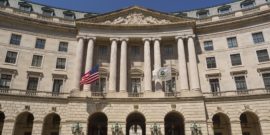Carter’s most important lesson is that Christians do more good outside of politics than in office.
The Pandemic in Hindsight
For many Americans, March 11, 2020, was the day when it all became real. For some weeks rumors had been circulating about the “novel Coronavirus” out of Wuhan, China. Cruise ships had been quarantined and sanitizer stockpiled. It was the morning of March 11, however, when Dr. Anthony Fauci told Congress that there were already hundreds of confirmed American cases of Covid 19, making it unrealistic to prevent further spread. At lunchtime, the WHO officially declared a global pandemic. That evening, Americans got their first glimpse of the new normal when the NBA “postponed” two games on the spot, sending fans home disappointed. The NCAA announced that the March Madness tournament would be played without spectators, then canceled it outright. The Covid era had begun.
Crisis always illuminates in one way or another. In strange and unexpected situations, we learn things (both welcome and unwelcome) about ourselves and the people around us. It may take time, however, to get the perspective necessary for clear-sighted analysis. Five years on from that fateful day, Law & Liberty is looking back on the Covid pandemic and taking stock of lessons learned.
Those lessons may be of different kinds. Covid tested many things: leadership structures, supply chains, the scientific community, the healthcare system, communal support networks, families. There were people who demonstrated their probity and integrity under intense pressure, and people who proved their willingness to manipulate the public with “noble lies.” Institutions, likewise, had their mettle tested, and some (notably the public schools) roundly flunked the Covid test, while others proved their dedication and ingenuity. Restaurants found spaces for outdoor tables, putting up shower curtains to minimize risk. Churches held drive-in services. In some respects, the Covid pandemic functioned as a kind of roll-call. Who finds a way to come through for you when the chips are down?
For the political class, the pandemic posed another crucial question: Who wants to be a totalitarian? In the early days, when it was unclear what the public’s risk truly was or whether lockdowns would be effective, politicians could make semi-plausible arguments for sweeping restrictions on civil activity and commerce. Everyone heard about “flattening the curve” and “slowing the spread.” Those arguments lost force rapidly as it became clear that lockdowns and closures were not saving lives. The decisions leaders made at that point provided strong clues about their attitudes towards freedom. Did they value liberty and organic order, or did they relish the opportunity to exercise tight control over citizens’ daily activities?
That drama played out repeatedly over the next two years with debates over mask and vaccine mandates. Some authority figures showed prudence, circumspection, and courage in their stalwart efforts to protect liberty and restore normalcy. Others exuded hypocrisy, planning holiday gatherings even as they forced others to cancel them, or justifying massive public protests even as they insisted that it was too dangerous for people to go to school, worship God, or hold funerals for deceased loved ones.
The Covid pandemic was not a hoax. The virus claimed millions of lives around the globe, and over a million in the United States alone. It seems clear nevertheless that mistakes were made in responding to that threat, and it’s worth considering what a more prudent response might have been. No one can tell when the next pandemic will arise, or which demographics will be most threatened at that time. Meanwhile, myriad other dangers lurk on the horizon. Pandemics are not the only crisis that could test our institutions and leaders. Any time the general public is threatened, questions will inevitably arise about the proper scope of state authority, social and economic priorities, and the appropriate balance between preserving liberty and mitigating risk.
In keeping with the unprecedented challenge of 2020, we will be breaking precedent when it comes to the format of our monthly forum. Instead of our usual setup of a lead essay and responses, we have asked contributors to offer extended reflections on several different aspects of the Covid experience, including public health, economics, education, and more. Look for these to be published throughout the month of March.
The questions raised by Covid and the political response to it are important and should not be lightly dismissed. Nevertheless, if Americans learned one thing from the pandemic, it might be this: We still value our liberty. Let freedom ring.



